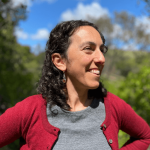Maria, Two Months Old, Had Congenital Zika. Should She Stay on the Immunization Schedule?

Maria* is a two-month-old patient at a Federally Qualified Health Center in Puerto Rico. It’s time for her two-month vaccinations -- but her doctor is hesitant. Maria had congenital Zika, which resulted in neonatal epilepsy at six days old. She’s been hospitalized three times for her seizures. She is currently taking Topiramate and Valproate, but her most recent seizure was just four days ago. Should Maria’s doctor keep her on the recommended immunization schedule, protecting her from prominent diseases like pertussis and the measles, or should she wait because of Maria’s seizures?
Late in the afternoon last Wednesday, over two dozen clinicians from all around Puerto Rico’s Federally Qualified Health Centers gathered their colleagues and logged into their computers for the first webinar of the new series of ZikaECHO to learn exactly what is the current recommendations for Maria and other patients like her. Dr. Rosa Bologna, a pediatrician, infectologist, and an advisor with the Pan-American Health Organization, a part of the World Health Organization, dialed in from Buenos Aires, Argentina to bring the participants the most up-to-date information on immunizations for children with congenital Zika.
“The sessions of this series focus on the development of babies with Zika, with fresh research from the areas where Zika is most prevalent,” explained Alma Galván, MHC, MCN’s Senior Program Manager of Environmental and Occupational Health, who moderated last week’s session. The popular Spanish-language Project ECHO, presented by Migrant Clinicians Network with support of the National Association of Community Health Centers and in partnership with the American Academy of Pediatrics and the Asociación de Salud Primaria de Puerto Rico is beginning this new series to provide frontline clinicians with access to Zika experts from around the world and other clinicians treating Zika patients across the island.
But back to Maria: Dr. Bologna began by covering how many babies could be in Maria’s situation, showing country-by-country how many cases of congenital Zika have been confirmed, and, critically, how it presents in the clinic. While the media has focused heavily on babies with microcephaly as a result of Zika, other specific symptoms may include ocular abnormalities like microphthalmia or chorioretinal atrophy, or congenital contractures like foot deformities or hip dysplasia. Non-specific symptoms include muscle spasticity, dysphagia, and hypotonia, often associated with neuromuscular disorders. And other complications that Dr. Bologna covered were extensive, from low birth weight to constipation to gastroesophageal reflux. Maria was one of thousands of infants born with congenital Zika virus infection without microcephaly. But, as her seizures demonstrated, her health needs were different than a typical two-month-old.
For most cases, babies with congenital Zika should be vaccinated on the regular schedule, Dr. Bologna emphasized. But, in Maria’s case, the doctor was wise to wait.
“Children with a history of seizures are at increased risk of seizures following the DTap, MMR or MMR-V vaccine,” Dr. Bologna’s presentation noted. While research does not establish an association between these seizures and permanent neurological damage, it is recommended that children with uncontrolled seizures delay the administration of the DTap, MMR, or MMR-V immunizations. “Once the seizures are controlled, get back on the regular schedule,” Dr. Bologna said. She went over a number of specific actions to take when delaying immunization to help protect the health of the child while the patient’s clinicians work to stop seizures.
Following this didactic portion, Dr. Carmen Cotto of Costa Salud presented a real case as a learning tool for participants. Dr. Ana Medina from the American Academy of Pediatrics, along with Dr. Bologna, asked participants questions, provided guidance, and engaged the cohort on how to best act. The complete one-hour session will be archived on our Project ECHO webpage, where visitors can access all recent sessions including our CHW ECHO project on diabetes and previous sessions on Zika.
“Right now, Puerto Rican clinicians are seeing the impact of Zika on hundreds of babies. The Zika course of disease is being written, “ Galván said. “ZikaECHO, as an innovative teaching/learning technique, allows MCN to provide clinicians with real life cases and critical thinking of experts in the field, so they are better able to recognize and care for their youngest patients who have suffered from Zika.”
*Maria is a fictional character but based on actual patients, used as a case study during the ECHO session.
Resources:
This is the last week of National Immunization Awareness Month. Promote staying on schedule through the CDC’s list of promotional materials.
Address wary parents’ concerns. Our recent blog post, “Shots: Immigrant Community Under Fire for Measles Outbreak. What Can Health Care Providers Do?” provides resources specifically tailored to immigrant parents.
This year’s dramatic drop in Zika cases has public health authorities breathing a sigh of relief, and pulled the virus out of the headlines -- but health providers are still learning how to best care for the thousands of children with health concerns resulting from congenital Zika. Follow the CDC’s MMWRs related to Zika to keep up on recent research and updated guidelines.
Visit our Project ECHO page to access archived sessions of MCN’s ZikaECHO.
Like what you see? Amplify our collective voice with a contribution.
Got some good news to share? Send it to us via email, on Facebook, or on Twitter.
Return to the main blog page or sign up for blog updates here.
- Log in to post comments
